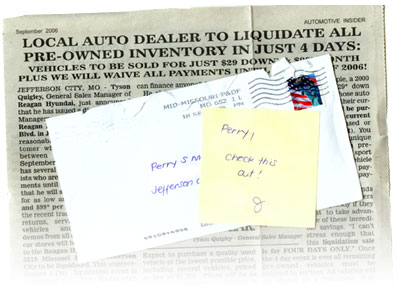
Dear J:
Thanks for sending me the newspaper story about the big liquidation at Reagan Hyundai. It looks like a great opportunity to buy a pre-owned vehicle!
Wait a minute. I don’t think this is a real story at all! You know what this is? It’s a sales gimmick! But that can’t be right, it came with a hand written Post-It note. What the heck is going on here?
This is what direct mail marketing has come to. Can the marketing wizards at the car dealership really think I’m this stupid? Or, do they think this is insanely clever and assume I will, too. My guess is they weren’t shooting any higher than just getting some chump to open the envelope. (“He opened it! He opened it!”)
From the same bag of tricks:
At a recent sales training session for a national marketing group, one of the more popular tactics for getting appointments was a how-to on hiding your phone number from the prospect’s caller ID. That one has haunted me all week. If the prospect knows it’s me calling she won’t take my call. So I gotta sneak up on her. How about dressing up as the Culligan man and toting in a big bottle of water? Once in the office, drop the bottle and start your pitch.
